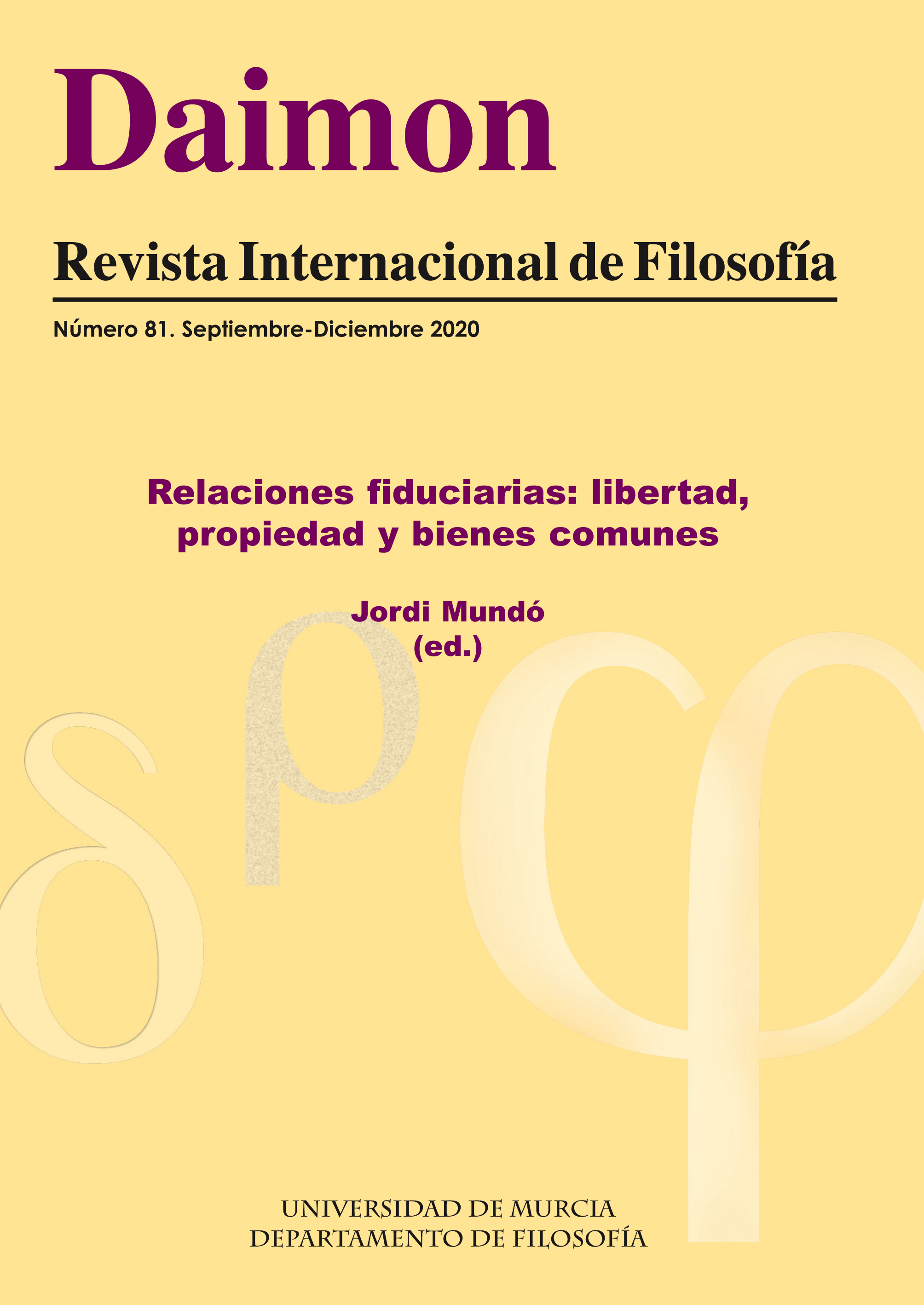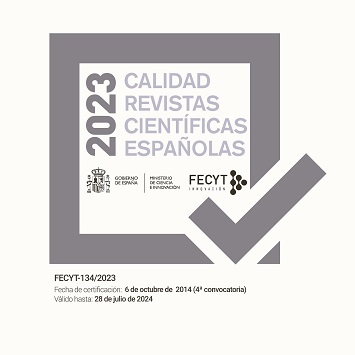Bargaining power and social distribution of capacities for the nationalisation of economic life: why basic income is a democratizing project?
Abstract
This article analyses in four stages the potential of unconditional access to resources in the conformation of free (re)productive relations. Firstly, it defends a notion of (economic) democracy requiring the presence of unconditionally predistributed resources. Secondly, it explores the link between predistribution and bargaining power. Thirdly, it presents the right to existence as a condition for an effective social cooperation worth taking care of. Fourthly, it discusses the role of basic income in processes of nationalisation of economic life understood as the expression of the democratic will of citizenry.
Downloads
References
Barragué, B. (2017), Desigualdad e igualitarismo predistributivo, Madrid: Centro de Estudios Constitucionales.
Barrowclough, D. (ed.) (2018), The Ins and Outs of Inclusive Finance: Some Lessons from Microfinance and Basic Income, Nueva York y Ginebra: UNCTAD.
Bertomeu, M.J. (2017), «Pobreza y propiedad. ¿Cara y cruz de la misma moneda? Una lectura desde el republicanismo kantiano», Isegoría: Revista de Filosofía Mo¬ral y Política, 57, pp. 477-504.
Birnbaum, S. y De Wispelaere, J. (2016), «Basic Income in the Capitalist Economy: The Mirage of ‘Exit’ from Employment», Basic Income Studies, 11(1), pp. 61-74.
Birnbaum, S. y De Wispelaere, J. (2020), «Exit strategy or exit trap? Basic income and the ‘power to say no’ in the age of precarious employment», Socio-Economic Review, disponible en https://academic.oup.com/ser/advance-article/doi/10.1093/ser/mwaa002/5727916.
Bosc, Y. (2016), La terreur des droits de l’homme. Le républicanisme de Thomas Paine et le moment thermidorien, París: Éditions Kimé.
Casassas, D. (2010), La ciudad en llamas. La vigencia del republicanismo comercial de Adam Smith, Barcelona: Montesinos.
Casassas, D. (2016), «Economic Sovereignty as the Democratization of Work: The Role of Basic Income», Basic Income Studies, 11 (1), pp. 1-15.
Casassas, D, (2018), Libertad incondicional. La renta básica en la revolución democrática, Barcelona: Paidós.
Casassas, D. (2020a), «Pre-distribution, Basic Income, and the Institutions of Economic Democracy», mimeo.
Casassas, D. (2020b), «Libertad incondicional y trabajo libre en sociedades pluriactivas: ¿qué papel para la renta básica?», Pasos a la izquierda, 18.
Domènech, A. (1995), «Individualismo ético e identidad personal», en: Aramayo, R.R., Muguerza, J. y Valdecantos, A. (comps.): El individuo y la historia: Antinomias de la herencia moderna, Barcelona: Paidós, pp. 29-43.
Domènech, A. (2004), El eclipse de la fraternidad. Una revisión republicana de la tradición socialista, Barcelona: Crítica.
Elster, J. (2007), Explaining Social Behavior: More Nuts and Bolts for the Social Sciences, Nueva York: Cambridge University Press.
Gauthier, F. (2017), «Communauté villageoise», en: Rochfeld, J., Cornu, M. y Orsi, F. (dirs.): Dictionnaire des biens communs, París: PUF.
Goodhart, M. (2007), «‘None So Poor That He Is Compelled to Sell Himself’: Democracy, Subsistence, and Basic Income», en: Hertel, S. y Minkler, L. (eds.): Economic Rights: Conceptual, Measurement, and Policy Issues, Cambridge: Cambridge University Press, pp. 94-114.
Gorz, A. (1998), Miserias del presente, riqueza de lo posible, Barcelona: Paidós.
Gourevitch, A. (2014), From Slavery to the Cooperative Commonwealth: Labor and Republican Liberty in the Nineteenth Century, Nueva York: Cambridge University Press.
Gourevitch, A. (2016), «The Limits of a Basic Income: Means and Ends of Workplace Democracy», Basic Income Studies, 11(1), pp. 17-28.
Hacker, J. S. (2011), «The Institutional Foundations of Middle-Class Democracy», en: Policy Network (comp.): Priorities for a New Political Economy: Memos to the Left, Londres: Policy Network.
Harvey, D. (2003), El nuevo imperialismo, Madrid: Akal.
Hirschman, A. O. (1970), Exit, Voice, and Loyalty: Responses to Decline in Firms, Organizations, and States, Cambridge, MA: Harvard University Press.
Kenworthy, L. (2013), «What’s Wrong with Predistribution», Juncture, 20(2), pp. 111-117.
Marx, K. y Engels, F. (1970) [1844-1845], La ideología alemana, Barcelona: Grijalbo.
Mazzucato, M. (2019), El Estado emprendedor. Mitos del sector público frente al privado, Barcelona: RBA.
Meade, J. (1964), Efficiency, Equality, and the Ownership of Property, Londres: George Allen & Unwin.
Mundó, J. (2017), «La constitución fiduciaria de la libertad política. (Por qué son importantes las coyunturas interpretativas en la filosofía política)», Isegoría: Revista de Filosofía Mo¬ral y Política, 57, pp. 433-454.
Mundó, J. (2018), «De la retórica absolutista de la propiedad al sentido común de la propiedad limitada», SinPermiso, 16, pp. 35-63.
O’Neill, M. y Williamson, T. (2012), Property-Owning Democracy: Rawls and Beyond, Oxford: Wi¬ley-Blackwell.
Pettit, P. (2012): On the People’s Terms: A Republican Theory and Model of Democracy, Cambridge: Cambridge University Press.
Rawls, J. (1988), «The Priority of Right and Ideas of the Good», Philosophy & Public Affairs, 17(4), pp. 251-276.
Rawls, J. (2001), Justice as Fairness: A Restatement, Cambridge, MA: Harvard University Press.
Rendueles, C. (2019), «Afavorencontra de la renta básica», Minerva. Publicación semestral del Círculo de Bellas Artes, IV época, 32, pp. 21-23.
Robespierre, M. (2005) [1792], «Sobre las subsistencias y el derecho a la existencia», en: Robespierre, M: Por la felicidad y por la libertad. Discursos (ed. Y. Bosc, F. Gauthier y S. Wahnich), Barcelona: El Viejo Topo.
Smith, A. (1981) [1776], An Inquiry into the Nature and Causes of the Wealth of Nations (ed. R. Campbell y A.S. Skinner), Indianapolis: Liberty Fund.
Standing, G. (2012), El precariado: una nueva clase social, Barcelona: Pasado & Presente.
Thomas, A. (2016), Republic of Equals: Predistribution and Property-Owning Demo-cracy, Oxford: Oxford University Press.
Thompson, E.P. (2019) [1991], Costumbres en común. Estudios sobre la cultura popular, Madrid: Capitán Swing.
Varoufakis, Y. (2016), «The Universal Right to Capital Income», Project Syndicate, disponible en https://www.project-syndicate.org/commentary/basic-income-funded-by-capital-income-by-yanis-varoufakis-2016-10?barrier=accesspaylog.
White, S. (2003), The Civic Minimum. On the Rights and Obligations of Economic Citizenship, Oxford: Oxford University Press.
White, S. (2012), «Property-Owning Democracy and Republican Citizenship», en: O’Neill, M. y Williamson, T. (comps.): Property-Owning Democracy: Rawls and Beyond, Oxford, Wiley-Blackwell, pp. 129-146.
White, S. (2020), «Labour, Capital and Commons: Three Sites of Predistribution», en: Merrill, R. (comp.): Predistribution, en prensa.
Widerquist, K. (2013), Independence, Propertylessness, and Basic Income: A Theory of Freedom as the Power to Say No, Nueva York: Palgrave Macmillan.
Wright, E.O. (2006), «Two redistributive proposals – universal basic income and stakeholder grants», Focus, 24(2), pp. 5-7.
Wright, E.O. (2014), Construyendo utopías reales, Madrid: Akal.
Las obras que se publican en esta revista están sujetas a los siguientes términos:
1. El Servicio de Publicaciones de la Universidad de Murcia (la editorial) conserva los derechos patrimoniales (copyright) de las obras publicadas, y favorece y permite la reutilización de las mismas bajo la licencia de uso indicada en el punto 2.
2. Las obras se publican en la edición electrónica de la revista bajo una licencia Creative Commons Reconocimiento-NoComercial-SinObraDerivada 3.0 España (texto legal). Se pueden copiar, usar, difundir, transmitir y exponer públicamente, siempre que: i) se cite la autoría y la fuente original de su publicación (revista, editorial y URL de la obra); ii) no se usen para fines comerciales; iii) se mencione la existencia y especificaciones de esta licencia de uso.
3. Condiciones de auto-archivo. Se permite y se anima a los autores a difundir electrónicamente las versiones pre-print (versión antes de ser evaluada) y/o post-print (versión evaluada y aceptada para su publicación) de sus obras antes de su publicación, ya que favorece su circulación y difusión más temprana y con ello un posible aumento en su citación y alcance entre la comunidad académica. Color RoMEO: verde.













